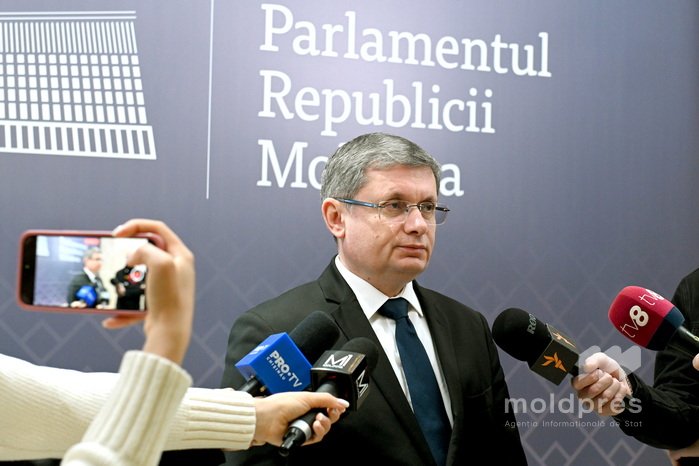
Speaker: 16 years ago, Moldovans firmly said Moldova's future within big European family
"16 years ago, Moldovans firmly said that Moldova's future is within the big European family. Now we are getting closer to fulfilling the dream of those young people to live in a country like abroad." Speaker Igor Grosu made the statement at the beginning of the plenary session.
He said that today we mark 16 years since young people took to the streets to demand the right to live in a free and democratic state.
"16 years ago, Moldovans firmly said that Moldova's future is within the great European family. We all believed that we would move faster. But in the following years, there were new attempts where self-proclaimed pro-European politicians continued to sell this country to Kremlin. Now, 16 years later, we are getting closer to fulfilling the dream of those young people to live in a country like abroad. In a European and prosperous Moldova. Therefore, we have no moral right to deviate from this path and must continue to work. Because it depends on us what will happen to Moldova in the coming years. I am confident that Moldovans will make the right choice this year, because Moldovans know who wishes us well and who does not," Grosu said.
Today we mark 16 years since the violent protests of 7 April 2009, one of the most controversial and significant episodes in the recent history of the Republic of Moldova. What began as a peaceful protest by young people against the alleged fraud of parliamentary elections degenerated and resulted in devastated buildings and maltreated youths.
The protests erupted a day after the Central Electoral Commission announced the victory of the Communist Party in the parliamentary elections with almost 50% of the votes. Young people, mobilized on social networks, took to the streets accusing election fraud and demanding a new election. On 7 April, over 8,000 protesters gathered in Chișinău. Initially peaceful, the protest quickly degenerated into violence. The Presidential and Parliament buildings were devastated and set on fire.
The circumstances of the escalation of violence remain unresolved. Well-organized groups were observed among protesters, acting with suspicious discipline. The state buildings were defended by young police academy students, completely unprepared for the scale of events. The hoisting of the Romanian flag on the Presidency building fueled suspicions of a possible provocation.
Although a parliamentary commission documented the abuses, no person from the then leadership was held accountable. The only ones convicted for the violence that day were then Minister of the Interior Gheorghe Papuc, former general commissioner of Chișinău Vladimir Botnari and policeman who killed Valeriu Boboc.
16 years after those events, citizens of the Republic of Moldova still have questions about what happened that day, the investigation of the causes that led to the escalation of the demonstrations, and especially the punishment of those responsible for the deaths of the four young people and the injury of several dozen others.
New state secretaries appointed at MEC, MDED
One ambassador recalled, two others appointed in other states
Moldovan PM says neutrality does not protect you, if tank comes towards you
Moldova, Kingdom of Morocco sign cooperation documents in foreign affairs, economic relations
PHOTO GALLERY // Official visit to Chisinau by Minister of Foreign Affairs, African Cooperation and Moroccan Expatriates of Morocco Nasser Bourita
Moldovan PM says Russia, through crime rings, pours money for destabilizing Moldova, buying Moldovans' votes
Moldova moves closer to European integration
Deputy Prime Minister meets Ukrainian envoy
Agenda of Moldova-Ukraine cooperation discussed at Foreign Affairs Ministry
Parliamentary elections on 28 September
Moldovan parliament turns down motion of censure on policies of Infrastructure and Regional Development Ministry
Airline launches direct flights from Chisinau to two European cities
Holy Fire to be brought to Moldova this year too
President: Our task - to maintain internal stability and join European Union in next 4 years
Moldovan PM says government to continue to support farmers
Moldovan parliament speaker conveys message on 35th anniversary of first parliament's establishment
Moldovans traveling to EU member states to pay lower roaming rates
Situation in agricultural sector discussed at meeting with Moldovan farmers, competent associations at government
Moldovan citizens encouraged to choose local products in context of Easter Holidays
+PLUS budget adopted by Moldovan parliament
Moldovan president's message in parliament
Moldovan president: We want just peace in Ukraine
PHOTO GALLERY // Moldovan President gave speech in plenary session of Parliament
Application of asking for military booklet to be able to be submitted online in Moldova
MPs held moment of silence in memory of rocket attack victims in Ukrainian city of Sumy


